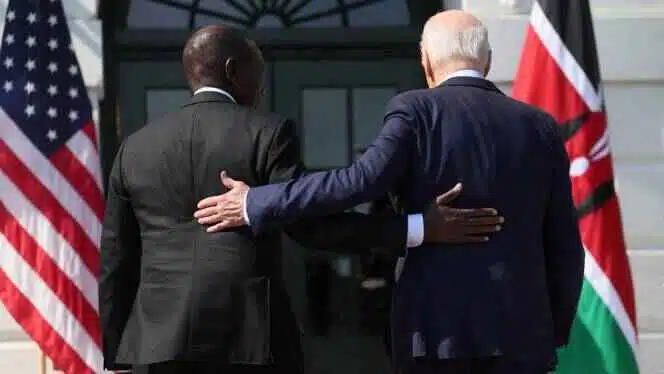Kenyan President William Ruto launches first state visit to Washington by an African leader in more than 15 years as President Joe Biden works to overcome geopolitical headwinds throughout the continent.
During the course of Kenyan President William Ruto’s three-day state visit, which began with an honor guard and will end with an opulent dinner on Thursday, US President Joe Biden is anticipated to declare Kenya a major non-NATO ally. Ruto was received by Biden at the White House.
Kenya, which has long had strong ties to China and Russia and is sending 1,000 troops to Haiti as part of a UN-led force deploying to address the security crisis in the Caribbean, would be the first nation in sub-Saharan Africa to receive the designation. This move reflects Washington’s desire to strengthen ties with Kenya.
Other nations like the Bahamas, Barbados, Benin, Chad, and Bangladesh are anticipated to support Kenyan military.
Close non-NATO allies with strategic working links to the US military are given this status by the US.
March saw Biden make good on his pledge to Qatar earlier in the year by designating the country as a key non-NATO partner of the United States.
Two US officials, speaking on the condition of anonymity, described Biden’s mostly symbolic designation as a sneak peek at an announcement that will be made later during Ruto’s visit. Ruto’s tour started on Wednesday afternoon with a meeting with American and Kenyan tech leaders at the White House.
Biden remarked, “I can’t think of a better way to kick off this visit,” as the leaders began their meeting with tech executives.
Millions of lives are being transformed by the new technology that our people have pioneered and pushed us forward. Literally millions of lives, mind you. And we’re not going to stop there.”
Kenya as an important associate
At a time when South Africa was pursuing its own more autonomous foreign policy, Kenya has shown to be a stable and trustworthy partner for the US, according to Gyude Moore, head of the Africa Initiative at the Center for Global Development.
It seems sense to designate them in that way. However, it is unclear what this means in practice for the typical Kenyan, according to Moore.
The decision would formalize a transition that has seen Kenya “move more squarely into a US orbit” in recent years, including stronger collaboration on Somalia, according to Cameron Hudson, a fellow at the Center for Strategic and International Studies.
It’s really important. It’s unique to sub-Saharan Africa,” he declared.
Although the US has historically relied on its regional allies in Africa, ties have worsened with a number of important nations, according to Hudson.
By initiating a lawsuit against Israel’s genocide in Gaza and declining to join the sanctions imposed on Russia in the wake of the invasion of Ukraine, South Africa has infuriated the United States.
Nigeria, the most populous country on the continent, has experienced internal unrest, while Ethiopia lost the favor of the US due to the horrific conflict in its Tigray area.
“So Kenya really stands alone right now, I think, among regional powers that the United States can rely on,” Hudson stated.






